Returning to my first lemon leaf tea in five years, I happily settled on the grass mat with a Christmas mug. I was nearly out of the emotional woods with this favorite, sweet elixir and a few cold pancakes. I sighed and scanned the room, finally noticing two photos taped to the wall, one of my mother in the snow and another of my grandmother holding my baby niece. I should have just accepted that a breakdown was inevitable.
Sacrificing mentality
At what moment, after leaving your culture to adopt another, do you realize that you might have given up too much? Are we all willing to forget where we came from in order to merge into something new? How can you express your life to another culture without giving the impression of insensitivity? How much food can you eat that you dislike just to be polite? Do you tell your host that you don’t like some things just to make the majority of what you eat comforting?
Am I eating what I think I'm eating?
Trying interesting foods across the globe, I've attempted to be as careful as possible - popping Pepto, drinking bottled or treating my own water, used hand sanitizer and cleaning my own utensils. But when it comes down to it, I gotta eat. Who knows when something will upset your stomach and give you the infamous traveler's diarrhea.
My Fijian calling: rugby
In my 24 years, I have yet to learn or play rugby and have little knowledge of the game. My first game of touch was not to pretty. Actually, it was horrible. I have played a lot of soccer, so the running part wasn't a problem. It was the constant reverse passes and incredibly fast opponents. All the men are excellent athletes and put my lazy American butt to shame.
Feet Don't Fail Me Now: Day 43
This post was written by Garrett Russell. We rely on our bodies to work. That's a no-brainer. Traveling on a budget often involves staying in a hostel, taking public transportation, and very commonly using your appendages to get from place to place. I have walked all over this planet, and I expect my body to continue accommodating my knack for physical exertion.
But then I stepped on a nail.
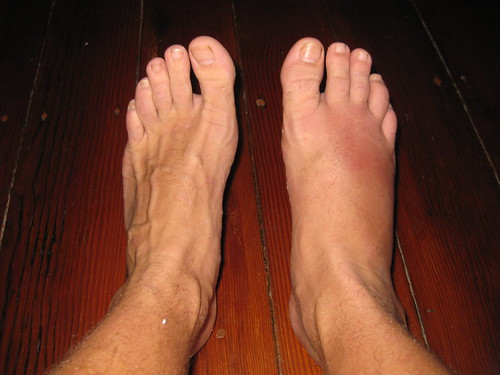
The Ouchy Stuff
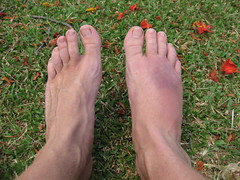
I thought I knew how to treat a wound. I've taken basic aid classes. I have a Bachelor's degree in Science. After stepping on the nail, I tried everything I knew possible to stop the impending infection. It probably didn’t help that I went swimming right afterward. I slapped a bandage on my foot and ran straight to the river. It was that hot.
The next day, my foot was not in good shape. I took some medication, tried to bear the pain, and hoped my body would handle the seemingly minor issue. Of course, Fiji isn't suburban America. I could never fully get clean in the Highlands.
The Fijians offered some interesting remedies, and even though I was skeptical, I gave them a try, for the sake of experiencing new methods. First, a boy named Cotu Cotu beat my foot with a stick to bleed out the wound - right after I removed the nail. Then Daiana, a woman of similar age to myself and Lindsay, placed my foot over a pot of boiling water with medicinal leaves. I gave in and allowed my foot to be scalded by steam for as long as possible. I was told to not walk on cement, because the wound would sense it and not heal. I was told to place as much pressure on the wound as I would normally, but as time went on, it was too painful to continue that route.
The Nurse Stuff

Obviously, the Fijian way of life is very different from our American ways. In the Highlands, if something doesn't concern someone, they don't find out (aside from the widespread frequency of gossip). And asking doesn't help either, because if there is no need to know, why ask? No one found it necessary to tell us there was a dispensary in the village, even after we asked about the nearest clinics. It wasn't until our little friend, Samu, showed up with a bandage on his leg that we knew we weren't the only ones with health supplies. We have been in the village for a month and a half, and we just found out what was potentially the most valuable resource we could have asked for regarding the project's success.
Vita managed the government-funded dispensary, meaning the government built a nice little house the size of an American bathroom and filled it with medical supplies we barely knew how to use. Having taken a few classes on first aid, Vita volunteered to be the one in charge, dedicated her time and her own money to make sure it was well-stocked and manned by someone savvy.
Hobbling over to the dispensary, we introduced ourselves to Vita and asked for some medical attention. She turned out to be the coolest women we'd met in the village, and we decided to give her all of our medical resources in order to train children and adults to find her for first aid.
The Undeniable Pain Stuff
The pain continued to escalate and was most bothersome when I tried to sleep. Not only was I sweating my you-know-what's off, but I was also fighting off mosquitos, lying on a hard floor, and trying to ignore the pulsing pain from my ever-swelling right foot.
Question: What do you do when you don't feel well?
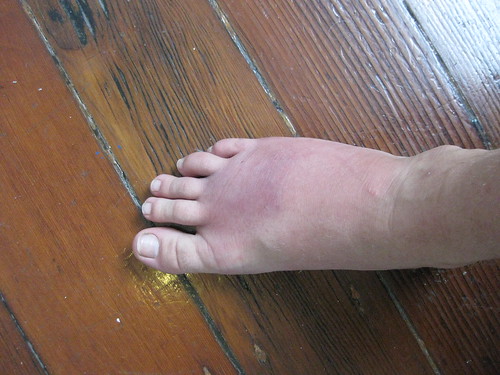
Answer: Call your Mom.
I called her from the village phone, and with the use of Skype's awesome international rates, she gave me some comfort and valuable insight. I started taking Lindsay's antibiotics, but the bacteria traveled too deep into the soft tissue of my foot to be extracted. Since they didn't do the job 24 hours later, I had to go to Suva. As always, Mom knew best.
I found it ironic that I was in a village to teach people how to stay healthy, and I was the one that got a serious infection. Luckily, I knew when it was time to seek medical help, even when the villagers told me I'd be okay. Being the most savvy medical personnel in the village at the time, it was a big wake up call to realize I was the only one who could help myself.
The Doctor Stuff

The road to the village was still impassable over Namado, so at 5:30am, Lindsay and I walked the longest, darkest, most painful kilometer of my life. Wearing Crocs and using the side of my foot, I hobbled as fast as I could to reach the carrier on time. We parked in Suva at 10:30am, and the carrier was bound for the village three hours later. We booked it to the Suva Private Hospital.
With Lindsay on my arm, we flew via taxi to the medical center and, within twenty minutes, saw a doctor. Medications were prescribed, and for less then $25 USD, I was free to go - with one exception. The doctor asked me to stay in Suva for at least three days to make sure the infection did not spread or worsen.
Jackie was expected in three days, and Lindsay wanted to make sure everything was set in the village and that classes continued. For the first time on our trip, Lindsay and I parted ways.
The Suva Stuff
I sat in a coffee shop, searching frantically for a place to stay. My mind's monologue was endless. I was by myself, thousands of miles from home. I had an infection in my foot, and it was starting to travel up my leg. What if the medication didn't work? What if I have to have my leg removed? Would Fiji really be the place to seek medical help? Will my travel insurance cover amputations? Where can I stay that won't cost me an arm and a leg...
I found the South Seas Hotel for $7 USD a night. Though lacking in most creature comforts, I was happy to have the small bed and ceiling fan. I slept a lot. The infection completely wiped me out. I rested up, let myself heal, and prepare for our final month in the village and the arrival of Jackie, our first Nakavika Project participant. After almost two days, I could walk with a small limp, which allowed me to explore the capital city. I took in the epic cinematic masterpiece of Avatar - an interesting contrast to rural village life.
After those two days, I missed Lindsay, my foot improved - thanks to some Ciprofloxacin - and I was mobile enough to surprise our guest a day early at The Uprising.
The Practical Stuff
What would you do if your trip was interrupted by an injury? Do you have the knowledge to take care of yourself or your travel companion?
Here are a few tips that will help you prepare in case of an emergency.
- Travel Insurance. GET IT. Not only is it extensive, but it's reasonably priced. I recommend World Nomads.
- Be prepared. Know about the necessary immunizations for every destination but also think about bacterial infections. You may have a cut that never heals because of bacteria in the air, water, dirt, or inside your body. This is caused by poor hygiene (sometimes you can't help it), unclean water, and food.
- Bring enough or always have handy some sunscreen, aloe, band aids, antibacterial ointment, Pepto-Bismol, Immodium, and pain relievers. Water purification tablets aren't a bad idea either, and it's best to bring them from home to avoid the search abroad.
- Don't forget to hydrate! Drink water...'nuff said.
- Bring some supplements. I eat a terrible diet on a budget. In Europe, I went through one country on bread and Nutella.
- Notify the U.S. Embassy that you will be visiting their country. This will bring you up-to-date information about the country and provide valuable information in case of emergencies.
- Learn through IAMAT where the best and nearest traveler-friendly hospitals are in your destination countries.
httpvhd://www.youtube.com/watch?v=9P_2iuMDRHo
Have you had a similar occurrence on the road? A bad health problem you had to figure out or brave traditional remedies to try and fix? Share this post if you found it interesting or helpful, and comment your experiences/opinions below!
Independence in a Communal Society: Day 39

Returning after our holiday, we had not only our backpacks but boxes worth of books, school supplies, and ingredients for a week of comforting menu items. Fane gave us no hint as to when she would return to the village, and we were given permission to run her household to our liking, to cook and clean for ourselves. After being dependent on others for a month, we came back with something to prove to the village.
Making the Exotic Familiar
Ten days of tourist comfort reminded Garrett and me how much we yearned for the familiar: reasonably pure water, meals with lots of protein, comfort foods, and clothing that had even the slightest resemblance to clean. Instead of being reluctant to return to the adventure, we decided to find a new comfort with what Fiji provided; however, this also meant we took a turn for the debatably worse. Thankfully we didn't let the others closely witness the change, but we took it...there.

We became 'Mericans. Throwing our backs into the job of tidying the house, we scrubbed nature raw, paving paradise...in the 'Merican way. Taking the pure produce of the Highlands and frying it into submission, we cooked with Fijian ingredients...in the 'Merican way. Positioning our laptops near our work stations, we performed household duties while bouncing around in shorts listening to Lil' Wayne embrace obscenity...just like the 'Merican way prescribes.
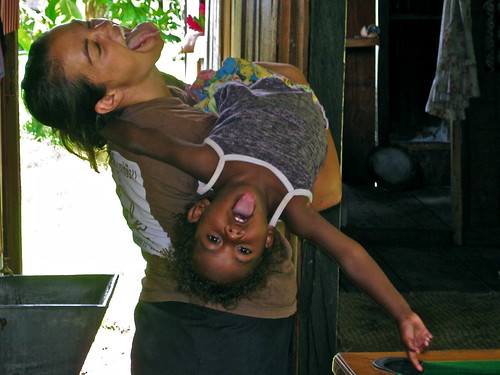
Occasionally, we had a visiting mother come see what we were up to, curious as to why every piece of flatware spread across towels to dry in the hesitant breeze. The kids were ever-inquisitive, asking to play cards in our main room or shoot pool just to be in the presence of the beats. Most of the villagers found it surprising that we cared enough to scrub the walls and floors until the original colors were visible. It did seem a bit odd to make viciously clean what was nearly submerged in pure nature, but we were tired of being told not to do what seemed natural to us.
We wanted to feel comfortable, like ourselves, and because we had each other, we found an excuse to escape from the Fijian experience in our own American oasis.
Walking a Fragile Cultural Line
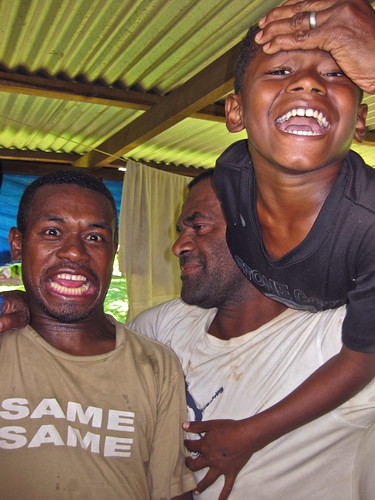
In the mornings, we were summoned by the neighbor children to come have breakfasts of scones, crackers, and tea. Though the fluffy scones in coconut cream were our favorite, we often wanted to experience our own breakfast routine (and infuse secret peanut butter into the menu).
Careful to not be offensive, we often explained that we'd already begun preparations of our own breakfasts of beans or oatmeal, sure to express our gratitude for the offer. The mothers always seemed pensive but understanding of our independence - we hoped our wild excitement for Fijian jobs well done would be endearing to them - but we soon felt them pull away and leave us alone for good.
Coming from a culture that encourages independence, we had trouble understanding why they didn't find our domestic attempts flattering. We mimicked their cleaning patterns and adopted the motherly civilities, like acknowledging everyone by name as they strolled by the house. The 'Merican oasis soon withered and became something akin to a typical household, as my sulu returned and Garrett took up manly duties.
When someone asked for help or a tool, we supplied them with what they wanted. And we continued to eat one or so meals a day at another person's house, in order to be social and imply our continued need and appreciation for their hospitality. We still had a desire to be a part of the communal atmosphere.
However, after a couple days of exercising our domestic capabilities, it felt as though we couldn't win both battles of comfort and acceptance. Our attempts to be comfortable while still submerged in another world were not universally well-received.
The Bi-Weekly Seminars
Even if our Martha Stewart tendencies didn't merit praise, we still thought our new adult classes would give us brownie points. We appointed Wednesday and Saturday nights as class nights, careful to swerve around rugby practices, processionals, committee meetings, and days when people typically went to the city.

That first Wednesday, we spread the word: Tonight is Q&A Night! We were teaching their children throughout those summer days, and yet most of the parents didn't really know why we were there or what topics we discussed. Additionally, people always seemed to have questions on health, hygiene, money management, and so on.
9pm came and went, and not one adult showed up, even after we confirmed the event with many of the main figureheads in the community. We sat in Fane's freshly cleaned common room, thumbing the little pieces of paper and freshly sharpened pencils we had prepared for the onslaught of questions and opinions. A couple friends stopped by to see what we were doing. "We're waiting for some of the adults to show for our Question and Answer session." The boys suggested we invite ourselves to a kava session, or we wouldn't be speaking to anyone that night.
The adults were busy with kava, as they were most nights. There was no special occasion, simply the occurrence of dusk. We became an afterthought, and though we knew no one meant offense by their absence, we couldn't help but take some. Sick of the grog and its apparently necessary presence at every social gathering, we were not about to speak over the din of a kava party about matters of health.
We went to bed defeated, hopeful for success next time, and comforted by a spoonful of peanut butter in a spotless room.
Pack your humor
I had many conversation with Lindsay, who has already been to Nakavika, about what to expect. After listening to her advice I came to the realization I didn't want to know everything. It's nice when traveling to have a Lonely Planet guide book with you - to help you out with the area that you are traveling to - but with this trip, I wanted everything to be a surprise to all my senses.
The long road to the village: Day 4
I can't imagine a better way to enter a village than the way we did - in the bed of a truck with two laughing kids, standing and facing the glow of the headlights, singing into the wind while the last peak of sun rested onto the distant hills, rolling up to a sleepy village where our friend and contact, Abel, walked up to greet us as the government Land Cruiser rolled to a stop.
The first steps into Fiji: Day 3
A blending of India's food and occasional putrid odors, Uganda's smoking fires and Hawaii's humid sweetness, spices and diesel exhaust, dust and flowers, fresh air infused with very specific whiffs of soap and oils - I can't explain Fiji's air any better than this. I wriggled in anticipation for Garrett's first smells of the island. After sitting/contorting in our seats for 11 hours across the blue Pacific, we stomped onto the tarmac . Garrett immediately cheered for his arrival to a country he instantly loved. The weather was uplifting, the people light-hearted, and all we had to do was pass through immigration to merge out of limbo into the South Pacific.
Even though we are planning some trips to scattered islands and are technically just visitors to Fiji, we decided, in our sleepless stupors, that we were teachers and should present ourselves as such to Fijian immigration. And so began a sweaty pursuit for an extension to our now limited visas.
While Garrett ran downstairs to exchange some money for the visa payment, I worked with the officials and made a hand-written document explaining our intentions for volunteering and where we would be staying. I had no idea what wording was expected, so I pulled out a few lawyer phrases I learned from TV.
That simple letter with an address for Nakavika was apparently all we needed…that and a letter from the school we claimed to be helping, only to find out in a couple hours that we had planned to be in Fiji for the exact days of the big nationwide school break. All these things we had to hurdle were mere technicalities, which we eventually figured out thanks to our friend and contact in Lautoka and another immigration office in town. Though we could have sidestepped the initial troubles by saying we were just tourists, it seemed we were being more honest with our intentions, and it really wouldn't be too hard to get a letter clarifying our acceptance and intent from the village when we get there.
A half hour on the Queen's Road got us to Lautoka, and since Sugar City is the only city I know in Fiji, we came back to a familiar (cheap) hotel, shopped at a familiar (colorful) market and met up with Kimbo at a familiar volunteer house - to tap into the Fijian mentality and become better acquainted with the savvy of an expat.
Running around in the [near] equatorial sun after a day of flying gave us a beautifully rancid stench, and there seemed no better remedy than taking a dip in the hotel pool. December 4th, 2009 and we were swimming outside. We couldn't help but laugh and splash and entertain ourselves with challenges from childhood, all the while feeling the disbelief in our current location.
I couldn't believe we actually went through with it. We came to Fiji.
Wandering town yet again for our last meal of the day, we found some great Chinese and moseyed back with plans to watch Star Trek on my laptop and take an evening swim. We fell asleep immediately upon getting back from dinner. It was 7:30pm in Fiji.
Next came the long, long road to the village of Nakavika.
The birth of The Nakavika Project, part 2
I often have people ask how I fund my trips. Obviously, the internship wasn't on my dollar, but Garrett and I felt so strongly about this trip we used our own funds to purchase these flights. Garrett sold his car, and I am using the last of my earnings from working in the past year. When we return from Fiji, I will have virtually zero liquid dollars, and Garrett will live at home and work until he leaves for East Africa on the government's dime. For us, it's worth it.
The birth of The Nakavika Project, part 1
L: "I found an amazing flight deal I want to look further into. If the price is right, would you consider dropping the road trip idea and heading to Fiji to live in a village? We could do our own thing there, use our skills to start some effort from scratch, and I know we're already invited and welcome to be there. I talked to them a week ago."


